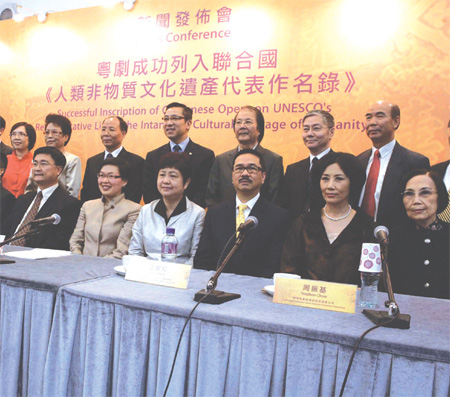City earns recognition for intangible heritage
Updated: 2009-10-31 07:08
By Li Tao(HK Edition)
|
|||||||||
|
Officials from Hong Kong, Macao and Guangdong attend a press conference at Hong Kong City Hall on successful inclusion of Cantonese Opera in UNESCO's Representative List of the Intangible Cultural Heritage of Humanity on Friday. CNS |
HONG KONG: Hong Kong had a day to take pride in its traditional culture Friday, with the official announcement that the 300-year-old art of traditional Cantonese opera has been added to UNESCO's Representative List of the Intangible Cultural Heritage of Humanity.
It's the first of Hong Kong's traditional cultural institutions to receive such distinction Macao and Guangdong shared in the honor. It was the collaborative efforts of all three regions to promote the traditional arts that led to the distinction.
Under Secretary for Home Affairs Florence Hui said Hong Kong had made unremitting efforts toward the development of Cantonese opera in the past few years. The Home Affairs Bureau set up the Cantonese Opera Advisory Committee (COAC) in 2004 to advise the government to promote Cantonese opera in Hong Kong. The Cantonese Opera Development Fund (CODF) established in 2005 to raise donations has granted about HK$20.3 million to support about 260 projects. HK$3 million was spent to nurture new talent.
"Each year, about 500 Cantonese opera and operatic singing performances were supported by the Leisure and Cultural Services Department. The Hong Kong government estimates around HK$33 million will be allocated for the promotion and development of Cantonese opera in 2009 to 2010," said Hui.
Fang Jianhong, director of the Department of Culture, Guangdong province, said even though Guangdong was in charge of the specific work for the inclusion, the success was the result of the cooperative efforts of all three regions. It is now for the three regions to implement the commitments made to UNESCO in the application. According to the Five-Year Plan for Culture Exchange & Cooperation between Guangdong, Hong Kong and Macao signed early this year, schools for Cantonese opera will be launched in Guangdong as a pilot to increase awareness of this Chinese heritage.
Macao also has a lustrous tradition of Cantonese opera. In the city of 20 square kilometers and 500,000 people, more than 85 Cantonese opera groups have registered with the government. Alice Wong, vice president of the Cultural Affairs Bureau of Macao, said Cantonese opera is not just the treasure of Cantonese speaking regions, but the heritage of the whole world. She expected the government to invest more resources to enhance the development of Cantonese opera.
Cantonese opera was added to the first national list of intangible cultural heritage by the State Council in 2006. The Central Government submitted applications to UNESCO in September 2008.
The UNESCO's Intangible Cultural Heritage List is intended to preserve and safeguard performance art, oral traditions, crafts and practices that have become traditions and cultural treasures among diverse people all around the world.
(HK Edition 10/31/2009 page4)
